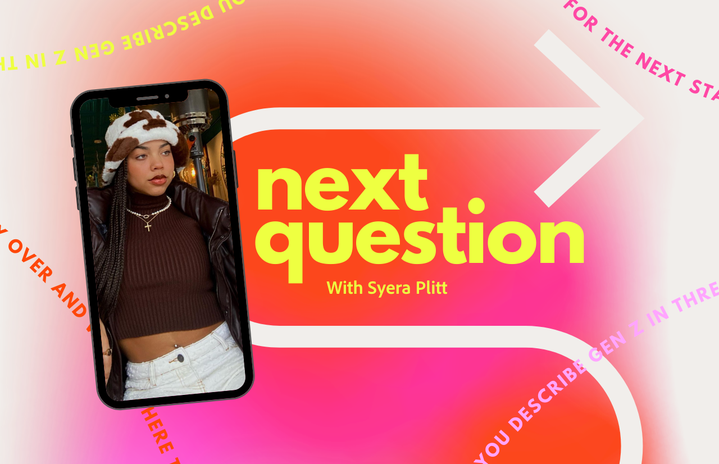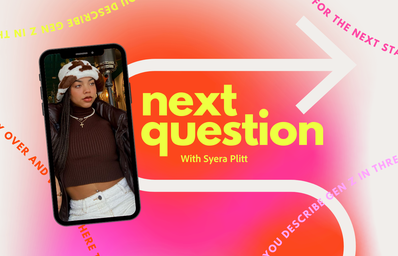This month, TikTok star Syera Plitt is in the hot seat to answer our burning questions. In Next Question, Her Campus rapid-fire interviews emerging Gen Z talent about what it’s like to rule over the Internet.
Stop what you’re doing right now, grab a piece of paper and a pen, and write down Syera Plitt’s name — you’re going to want to remember it, because she’s going places far beyond social media.
Plitt, 21, is best known for her dance videos on TikTok, though she’s also a student at USC’s Glorya Kaufman School of Dance, and has been training in dance academies since she was young. To use her words, she’s not a “torso-up” dancer; she’s the real deal. And being the real deal seems to have paid off so far, with her platform at 3.2 million followers and counting.
Plitt has ambitions to become a professional dancer (she even has a thorough 10-year career plan), and tells me wants to share more of her training and background with her audience. But in the meantime, some of her most popular TikToks are from her “sunglass drops” series, where she drops her sunglasses over her eyes in the middle of a dance routine. And while Plitt assures me that she does enjoy making those videos, she emphasizes her wish that she — and other Black TikTok creators — can be recognized for content other than what’s currently trendy.
“I notice that Black creators tend to need a gimmick to gain some type of notoriety on TikTok,” she said. “I feel like I had to be a TikTok dancer first, I had to be a sunglasses dropper first, in order to then make ‘pretty girl’ videos or just make a lip-sync video. We can’t just be attractive and push that like other creators can. We have to be funny, we have to be smart, or we have to be talented. Black people have to offer X amount of education or entertainment to then boost their platforms and switch to the content they actually want to share.”
She adds that Tracy Joseph, another Black dance creator whose choreography to “Woman” by Doja Cat went viral in August 2021, provides some hope for her that TikTok will shift away from this double standard in the future. “Black dance creators don’t usually get credited, and their videos don’t get as much traffic as people who do their trends,” Plitt says. “So for her to get the traffic that she did was very like, yes! Because finally, that’s recognition.” Plitt points out that Joseph’s virality stands in contrast to the past treatment of creators like Jalaiah Harmon: Harmon’s “Renegade” choreography launched many white TikTokers’ careers, while she didn’t receive the same level of fame.
Plitt’s dance background also allows her to share insight about the history of many TikTok-viral dance styles that those who are simply scrolling on their FYP may not be aware of. “A lot of TikTok dances are derived from Black cultural dance practices, so hip hop, jazz funk, isolations,” she says. “Those nuances that specifically come from Black cultural dance practices get diminished. When they become ‘trendy’ and they’re put on, let’s say, a white body, a lot of the internalized movement quality gets lost because it kind of just becomes a little one-two step, and there’s not really a groove, a rhythm, a nuance to it.”
Dance fans will want to keep following Plitt for her expertise and undeniable talent, but even if you knew nothing about the technicalities of the art form, simply watching Plitt have so much fun doing what she loves will convince you to come along for the ride.
1. WHAT’S ONE THING THE INTERNET DOESN’T KNOW ABOUT YOU THAT YOU WISH THEY DID?
There are a couple things, because I tend to keep my life private. Ironically, even though I’m known for dancing on TikTok, people don’t know that I’m actually a trained dancer. I don’t really post a lot of actual dance videos, which is something I want to start doing more of — the integrity of the dance community kind of gets lost within that TikTok space. But I have posted in the past some technical dance videos of me turning or doing other styles, and everyone is always surprised. They’re like, Oh, you’re a trained dancer? You, like, actually dance? And I’m like, What did you guys think I did?
And then another thing I’d say people don’t know about me is that I’m also a college student, and I’m currently in the process of starting my own dance business. I’m still working out all the kinks, but that’s something that a lot of people don’t know right now, that I’m very business-oriented as well.
2. HOW WOULD YOU DESCRIBE GEN Z IN THREE WORDS?
Gen Z is very fearless, accepting — to an extent, and I’ll get into it — and progressive.
I’ve noticed just from my parents and my grandparents, the shift in the way we tackle certain topics. The fearlessness comes in with this I don’t give a f*ck, let’s push for change type of thing that I appreciate.
But sometimes — and this is why I say accepting to an extent — it’s still murky waters. I feel like we’re in this period of transition, especially with what summer 2020 was looking like with the Black Lives Matter movement. There’s a wokeness that sometimes gets lost within this performative activism. So it’s hard to differentiate between the two.
But we are accepting because we’re not really worried about other people’s orientations, genders — you’re either a good person or a bad person. You know what I mean? I’m bisexual, and I came out to my friends two years ago, and they were like, Okay! It’s less concerning for Gen Z in general. I guess tolerance is a better word than acceptance. People are like, I’m not gonna bother you for your beliefs as long as you don’t bother me for my beliefs.
And I feel like that also ties in with progressiveness. I feel like Gen Z is very different in the way we maneuver and navigate our lives. Even with career goals — everyone now wants to be an influencer. I have seen this new wave of entrepreneurs. Like I said, I’m starting my own business. I’m an entrepreneurship minor here at USC. I think that’s very reminiscent of Gen Z as well, problem-solving and finding new innovative ways to make a career for yourself or make money. I’ve met a lot of people my age that are like, I want to be a free agent. I don’t want to work for a company, I don’t want a 9-to-5. We’re very career- and passion-driven, which is cool.
3. WHICH ONLINE TREND ARE YOU TOTALLY OVER, AND WHICH IS HERE TO STAY?
Definitely performative activism. If you’re coming from a place of education and actually care about the topic, then absolutely, make that your platform and make a difference. But if you’re doing it for the sake of saving face, the integrity of it is lost and the actual driving message is lost. It should be apparent that you care because you don’t do certain things and you change certain habits in your life or in the way you think about certain people, whether it’s regarding race, gender, sexual orientation You don’t have to put it on the Internet because it’s a trend, or post a black square because George Floyd died.
And I had to catch myself too, in summer 2020. I had to step back and say, okay, this is what I want to share about my personal experience, and it has nothing to do with this time and space. But because it is this time and space, there is a certain elevation of voices like mine, so I wanted to take the opportunity, rather than, like, posting a Black quote every day. I also do things privately for myself and for the people around me, and I have these educated discussions. I donate, I make sure I’m doing what I can to change it, but that’s not something I’m necessarily broadcasting to my platform.
For a good trend, honestly, information sharing. I have learned so many things on different topics I don’t learn in school, things I have never heard of in my life, on social media sometimes. I had a video saved a while back about some fun fact about Black hair, and I had to look it up to make sure it was real. And I was like, who was going to tell me that I was doing my hair care routine wrong?
I did it too, with a video about the whole jerking trend. From a dancer’s point of view, I was like, y’all are doing it wrong. And it was kind of my ick that day. Seeing that trend become popular, I was like, oh, this is funny coming from a dance educated background, because that’s not the jerk, that’s the reject. Maybe I’ll post about it! And most of the people in my comments section were like, Yes, thank you, you know the truth! And then other people were like, You’re ruining it for us! But a lot of the comments were like, I never knew this was true! And they looked it up.
4. WHAT ARE YOU MANIFESTING FOR THE NEXT STAGE OF YOUR CAREER?
By the time I’m a senior, I’m hoping that I’m signed to a dance agent, which I’m actually in the process of doing. And I either want to start my career in a contemporary ballet company — there’s a couple I’m interested in, like Complexions, or Alvin Ailey. Or LINES, which is in San Francisco; I auditioned for their summer pre-professional program and I got into that as well. So there are little steps I’m taking to make sure these things are secured by the time I graduate. And if I don’t go into company work, I want to go on tour or start booking major tours with artists because that’s a consistent cash flow. I think on top of that, upkeeping my social media work. Over this summer and throughout my senior year, I want to start filming for YouTube. I’ve had it on the back burner for a hot minute, and I feel like senior year would be an excellent time to do it.
I want to just professionally dance for a good majority of those first couple of years. I have a pretty good network right now, but I want to build that network to a point where I have a bunch of choreographers on my roster that I am very connected with. Then I can be like, Hey, I’m starting this dance business. If you want to be one of the faculty members, let me know. It’s basically a dance convention, that’s what I’m working on. I have a lot of gripes with the dance convention community. That’s what I grew up doing, competitions and conventions, and I went on tour with a dance convention when I was a sophomore in high school. So I have knowledge about that world, and there’s a lot of things that I want to change about it.
I’ve had a lot of my fans ask me to teach classes, especially when they find out I’m a real dancer, so that’s why I want to reveal more of my dance background like my training, especially on YouTube. And once I have a pretty good level of following, I want to then announce it on my social media platforms.
So that is my goal. I’ve been working on this since high school. I’m going to say that’s a 10-year plan, because I definitely want to dance first and have my own career before then teaching other young aspiring dancers and choreographing at other companies in my early 30s.
5. WHAT ARE THE FIRST THREE SONGS ON YOUR SPOTIFY “ON REPEAT” PLAYLIST?
“Your Teeth In My Neck” — Kali Uchis
“NEW MAGIC WAND” — Tyler, the Creator
“Swangin’ on Westheimer” — Don Toliver
This interview has been edited for length and clarity.


